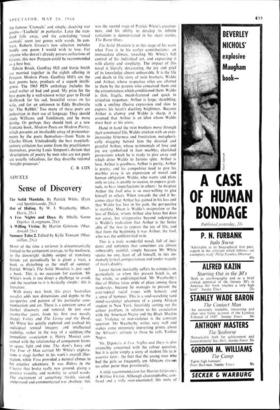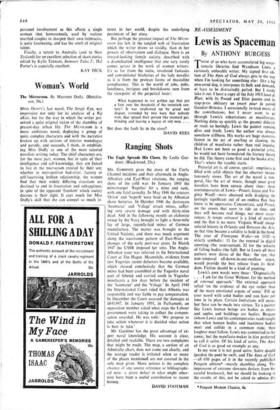NOt'ELS
Sense of Discovery
The Solid Mandala. By Patrick White. (Eyre and Spottiswoode, 25s.)
A Willing Victim. By Harriet Grierson. (Mac- donald 21s.) MOST of the time a reviewer is circumstantially limited to the competent average, to the mediocre, to the downright shabby output of transitory fiction, yet periodically he is given a treat, a book as disturbing as the smell of summer. Patrick White's The Solid Mandala is just such a book. This is no occasion for caution. Mr White's work is too direct a challenge to avoid, and the reaction to it is basically simple: this is literature.
With every new book this great Australian novelist adds new dimensions and depths to the perspective and pattern of his particular com- munication and art. There is a constant sense of further discovery and renewal. In just over twenty-five years, from his first two novels, Happy Valley and The Living and the Dead, Mr White has quietly explored and evolved his individual textual imagery and intellectual mobility, rather in the way of a sculptori. (the immediate association is Henry Moore) con- cerned with the relationship of component forms to space, light and time. The Aunt's Story and The Tree of Man carried Mr White's explora- tions a stage further in his work's overall illus- tration, while Voss provided a natural climax to his creative adventure. It was Riders in the Chariot that broke really new ground, giving a positive visuality and mobility to actual words. The excitement of something freshly viewed, understood and communicated was absolute: this was the second stage of Patrick White's creative- ness, and his ability to develop its infinite variations is demonstrated in his short stories, The Burnt Ones.
The Solid Mandala is to this stage of his work what Voss is to his earlier contributions: an immaculate climax, revealing Mr White's full control of his individual art, and expressing it with clarity and simplicity. The impact of this novel is literally devastating, the joy and grief of its knowledge almost unbearable. It is the life and death in life story of twin brothers, Waldo and Arthur, whose respective roles are allotted to them by the parents who conceived them and the circumstances which conditioned them. Waldo is thin, fragile, mean-featured and quick in
articulate responses. Arthur is large, shambling, with a smiling illusive expression and slow to express his heart's dazzling brightness. Because Arthur is clumsy and Waldo is sharp, it is assumed that Arthur is an idiot whom Waldo must bear as his cross.
Hand in hand the twin brothers move through their communal life, Waldo stricken with an ever- increasing bitterness and frustration, metaphori- cally dragging behind him the devoted and grateful Arthur, whose testimonials of love and joy are symbolised in four marbles, cherished possessions which he is ready to give away and which drive Waldo to furious spite. Arthur is love, Arthur is goodness, Arthur is purity, Arthur is poetry, and his compulsive need to give his marbles away is an expression of moral and human obligation. Waldo, who wants and plans only to take, is unable to receive, to express grati- tude, to bear imperfections in others: he despises Arthur the fool who is so over-willing to give himself to others. When towards the end it be- comes clear that Arthur has gained in his loss and that Waldo has lost in his gain, the perspective is startling. Mean is Waldo's resignation to the loss of Dulcie, witom Arthur also loves but does not covet, but vituperative beyond redemption is Waldo's realisation that Arthur is the better able of the two to express the joy of life, and that from the beginning it was Arthur, the fool, who was the unblemished twin.
This is a truly wonderful novel, full of inci- dents and sentences that sometimes are almost unbearably painful, simply because Mr White spares no one, least of all himself, in this im- mensely lyrical. compassionate and tender tragedy of man's duality.
Lesser fiction inevitably suffers by comparison. particularly so when this present batch is, on
the whole, so undistinguished. Mr Weatherby's Out of Hiding takes pride of place among these moderates. because he manages to present the ever-topical racial issues with honesty and a sense of humour. This is a soul-searching (and mind-searching) adventure of a young African
student in New York. feverishly sorting out the colour problem, in relation to his association with the 'American Negro and the Black Muslim sect. Violence or non-violence is the constant question. Mr Weatherby writes very well and makes some extremely interesting points about the African's attitude to those he calls Yankee Negro.
Mr. Dipoko's A Few Nights and Days is also ostensibly concerned with the colour question, but it is quite simply a story of student life in le quartier twin: the fact that the young men who bed the girls so frequently are Africans stresses no other point than promiscuity.
A mild recommendation for Harriet Grierson's A Willing Victim. Although claustrophobic, con- fused and a trifle over-emotional, this story of
personal involvement as this affects a single woman (not homosexual), used by various married couples to sharpen their own intimacies, is quite fascinating, and has the smell of original talent.
Finally, a return to Australia (and to New Zealand) for an excellent selection of short stories edited by Kylie Tennant, Summer Tales 2: Hal Porter's is especially excellent.
KAY DICK



































 Previous page
Previous page